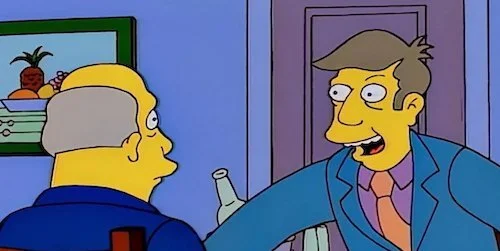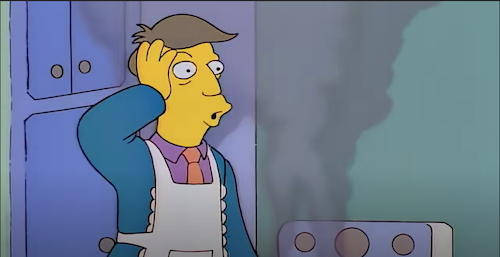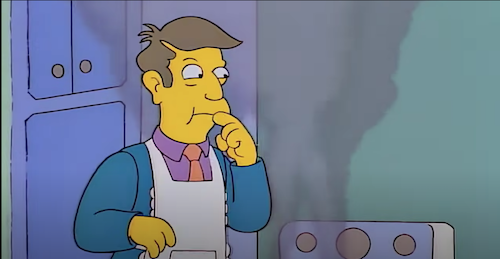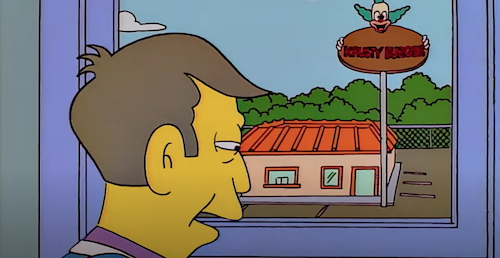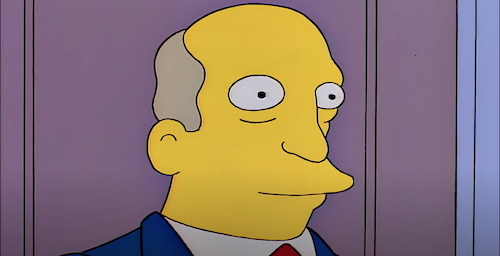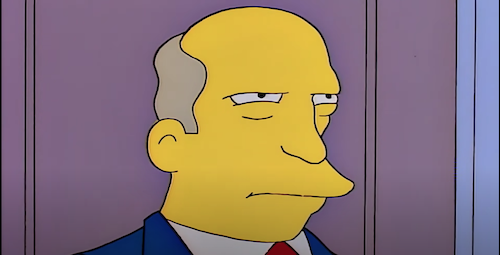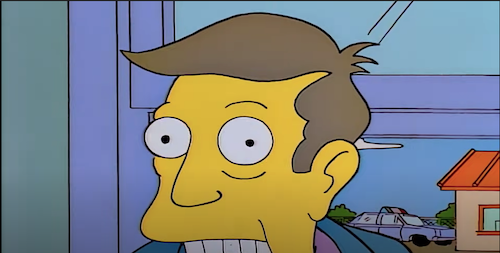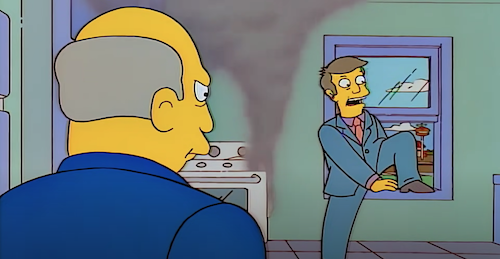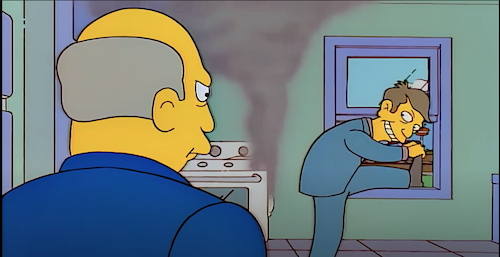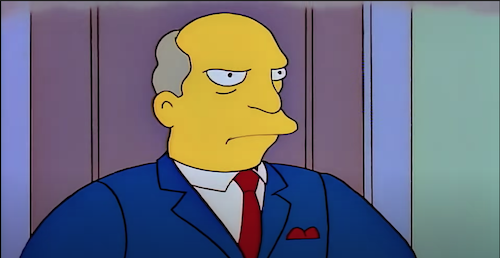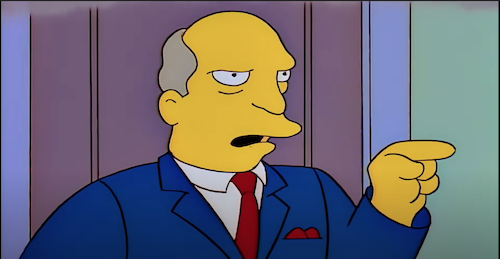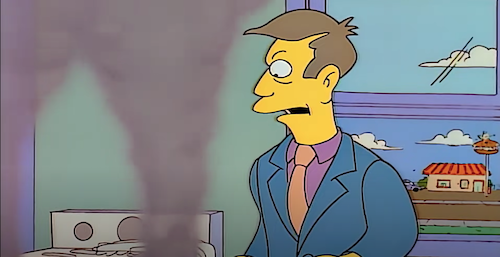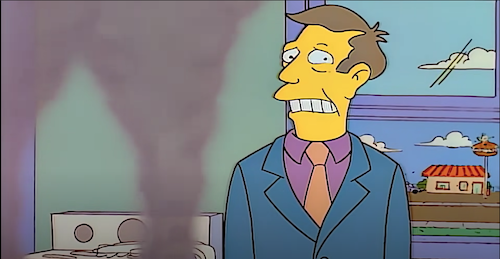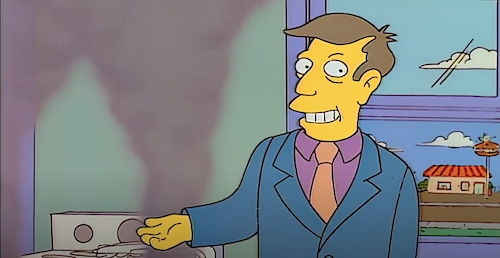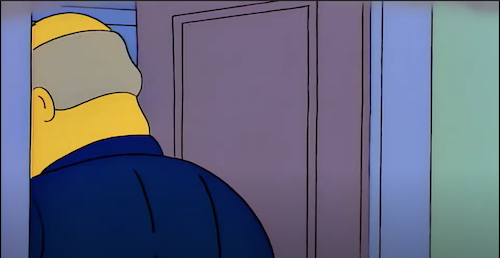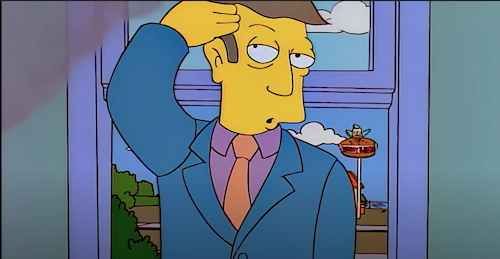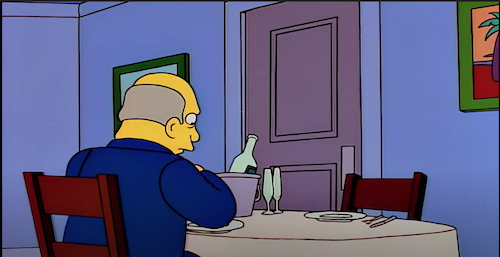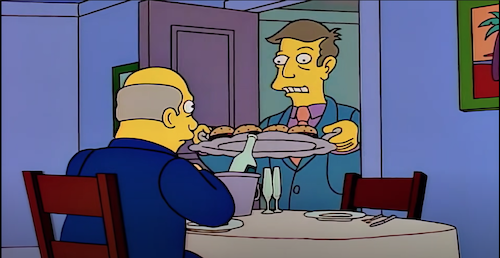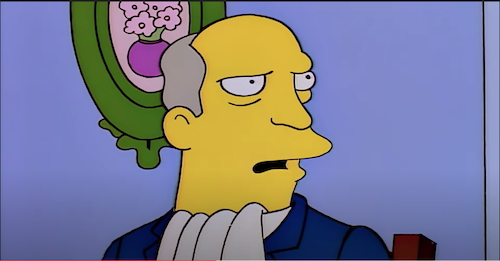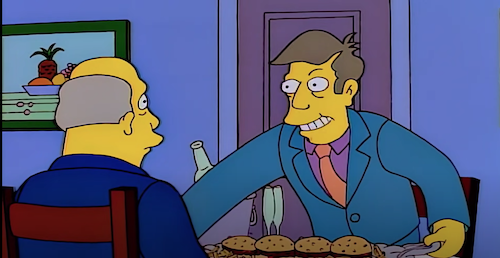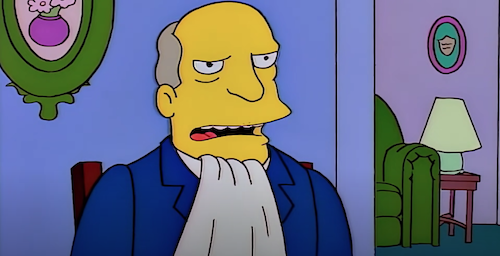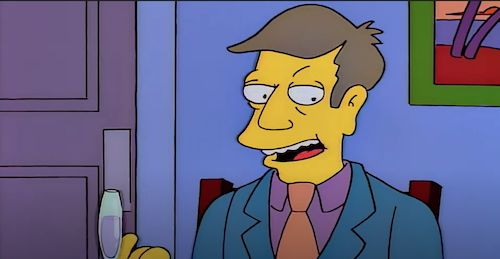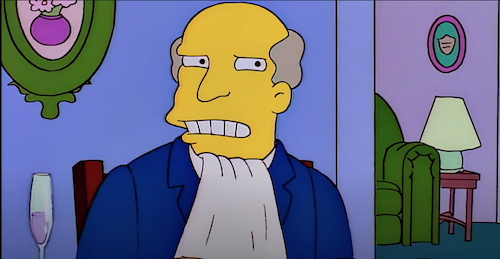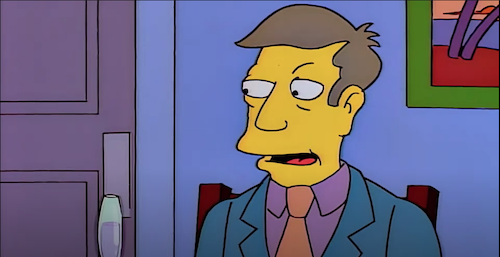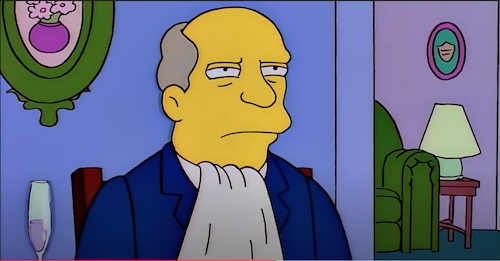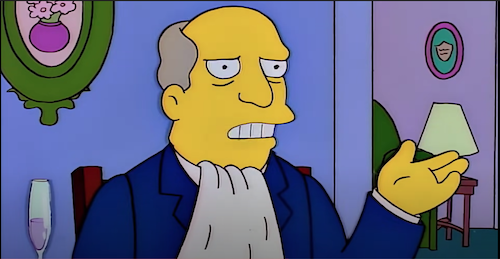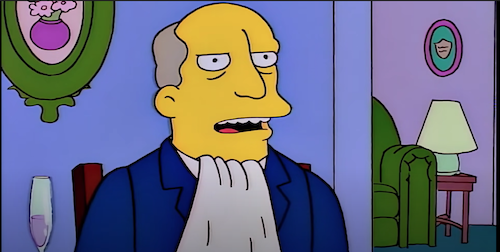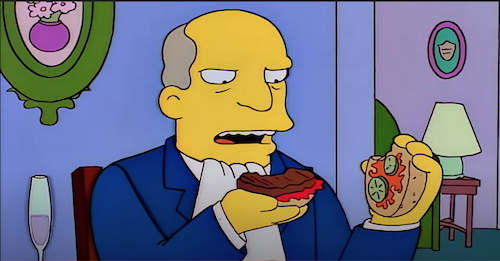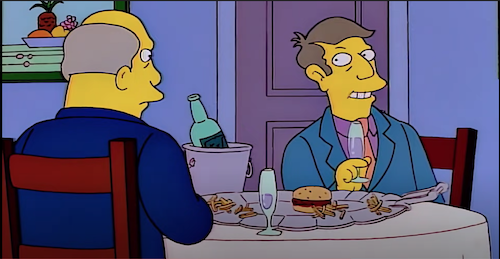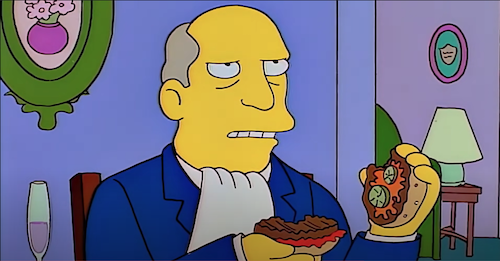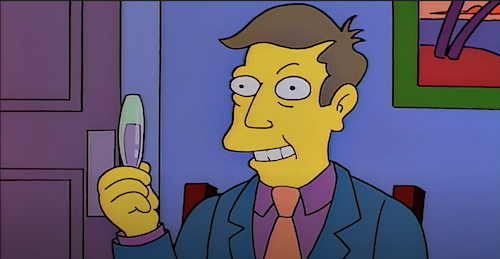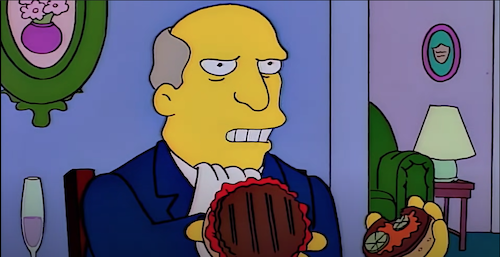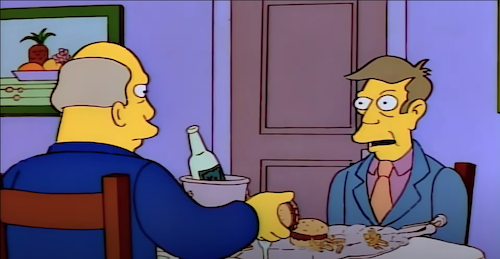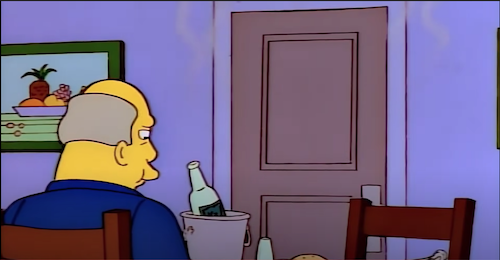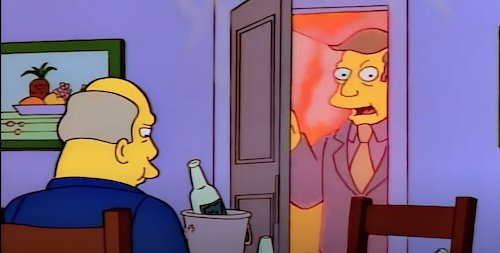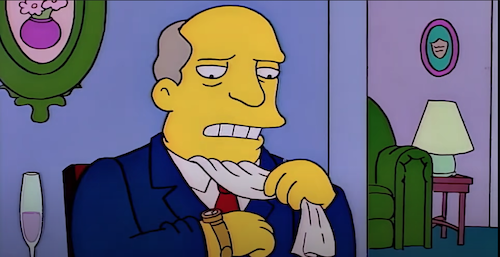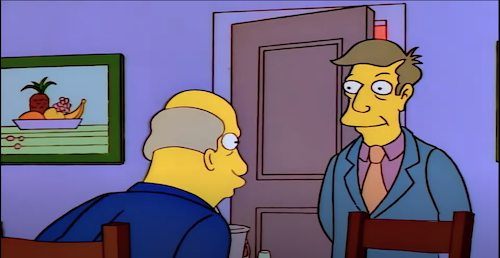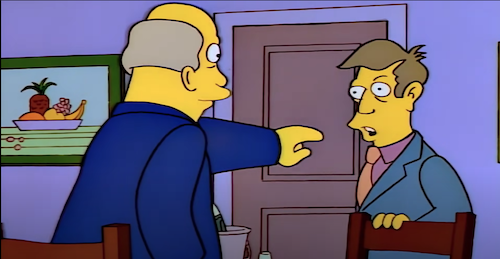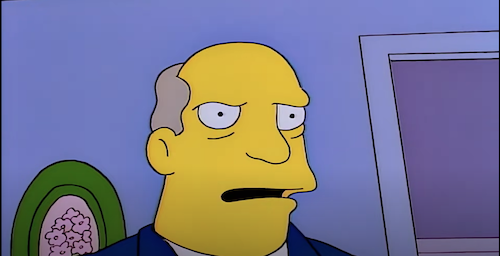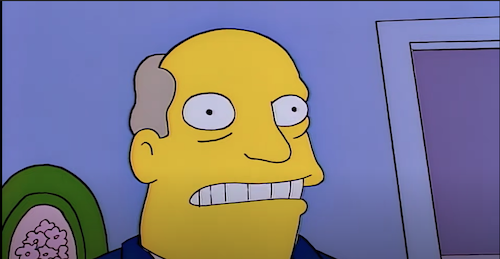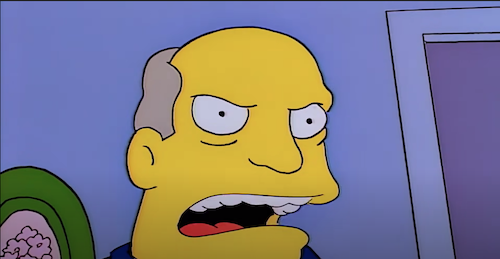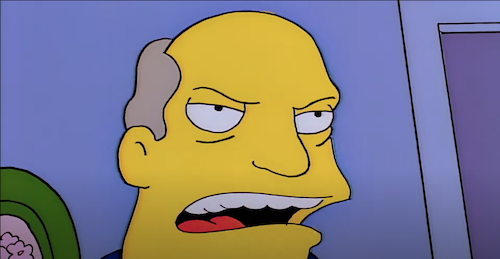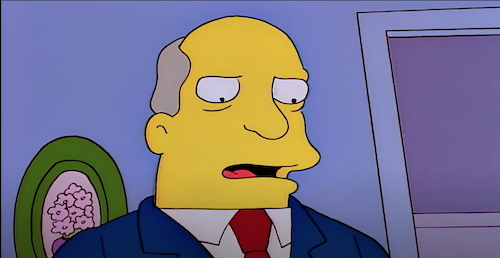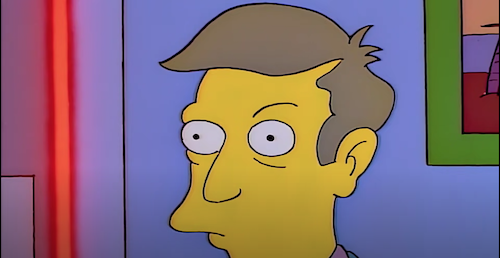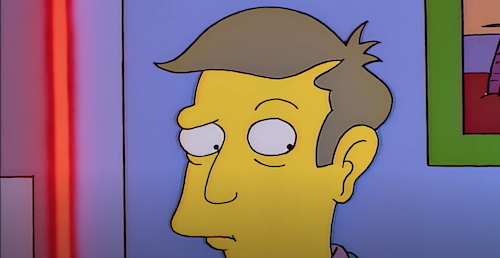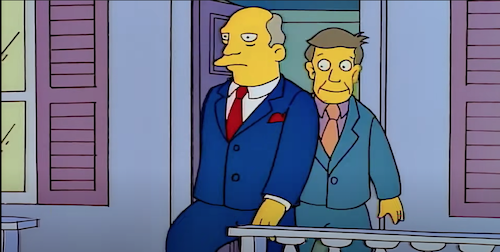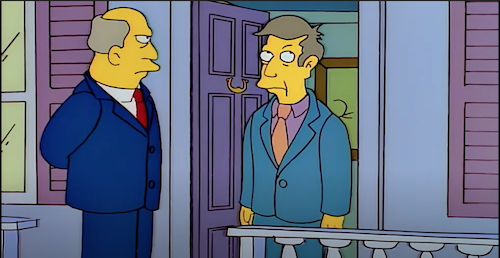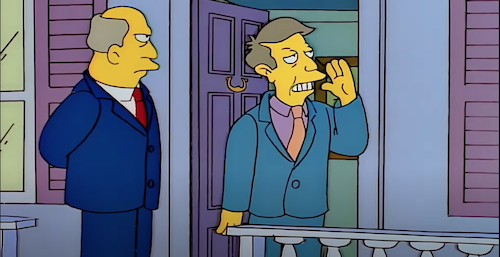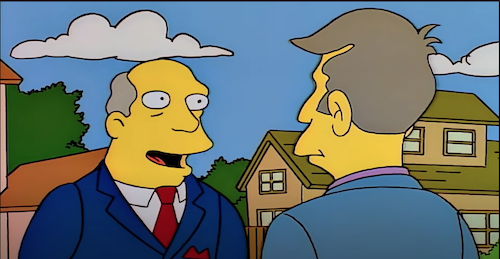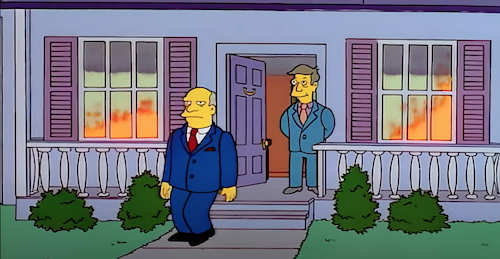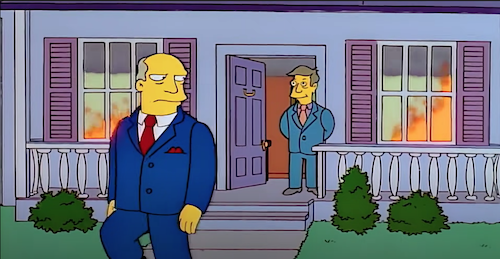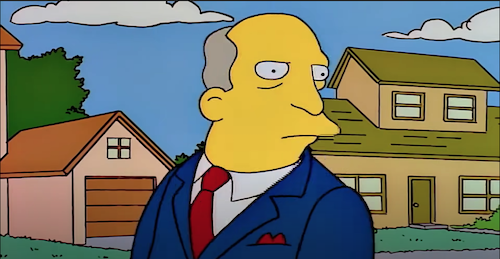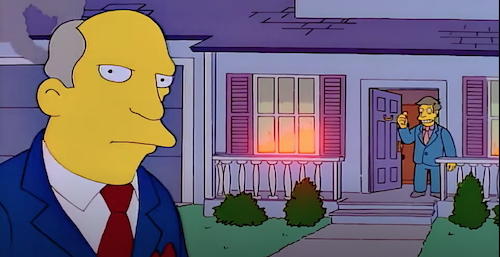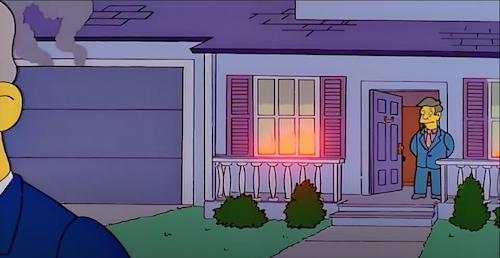Perfectly Written Scenes: The Simpsons-22 Short Films About Springfield
Written By Andreas Babiolakis
This Masterclass series will take specific scenes line-by-line, and will provide the importance of each and every piece of dialogue or narrative cue. This is an effort to highlight great screenwriting, and inform why these scenes might resonate so deeply with us.
I’m eager to begin sharing the new Perfectly Written Scenes series with all of you, and I’m going to do that with a bit of a sillier example, which isn’t any less credible. For a number of years now, the “Steamed Hams” scene of the “22 Short Films About Springfield” episode of The Simpsons has taken on a whole new life of its own. There is meme after meme (still being generated, and certainly shared) to the point of drowning out some of the other current Simpsons pop culture references. There’s just something about this strange interaction that people cannot shake off. I’d argue it’s because it’s a brilliantly written scene. Sure, I like to focus primarily on films and not television on this site, but I consider these scene to feel like a short film of its own (besides, I do dabble with television works occasionally on here).
Before we continue with dissecting this scene line-by-line, let’s actually watch it.
Hilarious, right? If you haven’t seen it before, there is so much going on here that is indicative of classic era Simpsons, when the writers (of the time) could stuff countless jokes into the shortest amount of time. That’s already working in favour of this scene, but there’s the extra challenge of telling an entire story in this amount of time as well (considering the episode is divided into a number of small, bitesized mini stories). Let’s dive right into it.
The first thing that’s important is that you don’t need to be a Simpsons fan to appreciate this scene. The sequence still plays out like a short film, with introductions of setting and characters. However, being a Simpsons fan certainly helps enrich the hilarity of this scene, especially if you’re familiar of Principal Skinner’s extremely discomfited relationship with Superintendent Chalmers (and his efforts to keep his job, as he feels threatened by Chalmers’ no-nonsense approach to the education system).
Exterior Shot: House
We’re introduced to the setting of this event: a house in suburban America (specifically the fictional town of Springfield). This shot is especially important in this sequence, because the story works cyclically. We see a character, unknown as to who he is (unless you watch The Simpsons), but he’s in a suit. He confidently rings the door bell.
Interior Shot: House
We can’t tell the state of the house, but we can see the second character of this peculiar exchange for the next two-and-a-half minutes: a medium shot of a man donning an apron over a suit. Clearly, whoever this is, he is preparing a meal, but also trying to look his best.
Extreme Close Up: Disgruntled Face
Even if you don’t know about Skinner and Chalmers, you can tell this first character is displeased, just by the way he looks when being greeted by the second character. Wouldn’t a visitor be excited? This is clearly business related, and not the comfortable kind. His reaction is supposed to be noticed, considering the scene’s cut to a closer shot of Chalmers’ face.
Chalmers: “Well, Seymour, I made it… despite your directions…”
We get a lot out of this first line.
1) The other character is named “Seymour” (Skinner).
2) As expected, Chalmers is bothered. The delivery of “made it” is not out of enthusiasm.
3) “despite your directions” indicates to us that Chalmers has zero faith in Skinner already, as he was given terrible directions as to how to get to his house. We already know Chalmers looks down on Skinner, and the tone for this sequence is now set: there’s a disconnection.
4) Take note of Chalmers referring to Skinner by his first name and his first name alone.
Skinner: “Ah! Superintendent Chalmers! Welcome! I hope you’re prepared for an unforgettable luncheon!”
Firstly, Skinner refers to Chalmers by his entire name, showing respect and the search for brownie points to get into Chalmers’ good books (clearly a primary reason why this luncheon is even happening).
His excitement is clearly feigned but an honest attempt at seeming cordial.
One final point to make about this line. The “unforgettable luncheon” remark is a hilarious statement in hindsight, because the entire endeavour was certainly one to remember (but not for the pleasant reasons Skinner was aiming for).
Okay, one final final point. Chalmers shrugs Skinner’s politeness off, which only increases the tension.
Interior Shot: Dining Table
We can now see that Skinner tidied up the place modestly. He didn’t go above and beyond to impress Chalmers with the furniture arrangement, but he did set up the table (and bucket of ice for Chalmers’ beverage, brought out of courtesy for this event). Chalmers sits, and Skinner guns to the kitchen without talking furthermore to Chalmers; there’s clearly a main priority right now.
Wide Shot: Kitchen
Instantly, we can see something isn’t right.
Close Up: Oven
Obstacle: Fire
Before we even have an extra second to realize, the sequence confirms our fears by zooming right into the steaming oven. We can consider this to be the first main obstacle of the story, even though Chalmers is clearly displeased with Skinner, because this can actually ruin the luncheon, as opposed to Chalmers, who is just rolling with the rendezvous (reluctantly, albeit).
Extreme Close Up: Skinner
Skinner: *gasps*
He’s now realized there’s a major problem with his roast. Not only that, but now there’s going to be a problem with this luncheon with Chalmers, which he was clearly trying to make as perfect as possible (again, possibly to get into his good books).
Extreme Close Up: Burning Roast
Skinner: “Oh, egads!”
In hyperbolic fashion, we now know what Skinner was preparing: a roast. We also know that it is clearly destroyed. The oven inferno is a clear, quick emphasis that this is a major problem that has to be tended to immediately.
Medium Shot: Kitchen
Skinner: “My roast is ruined!”
Skinner has recognized that his prepared meal for Chalmers is inedible.
Skinner stares off into the distance pensively
Skinner is hardly reacting to the burning roast in his oven. It seemed like the roast was his priority when he left Chalmers alone in the dining room, but it must not be, if he isn’t tending to this crisis right away.
Close Up: Skinner looking out window
A Krusty Burger restaurant is visible from Skinner’s vantage point.
Skinner goes to look out the window, maybe out of desperation, or because he is brainstorming beyond trying to solve the burning roast in the oven.
Skinner: “But, what if… I were to purchase fast food and disguise it as my own cooking?”
It’s crystal clear that Skinner isn’t thinking about the urgency of the burning roast now. He’s trying to have food to give to Chalmers to allow his luncheon to operate smoothly. Looking out the window gave him the idea to purchase some Krusty Burger as the solution to the problem of tending to Chalmers as a host, but not to getting rid of the burning roast.
Skinner: “Oh, hoh, hoh. Delightfully devilish, Seymour!”
In a way, this line feels like Skinner is enjoying how unethical this solution is, as if it defies all of the work he put into being proper for Chalmers; he’ll have a way to save this problem, whilst doing it dishonestly and without Chalmers ever knowing. His expression is confirmation that he is dead set on fulfilling this plan (also a continuation of his lack of concern for the burning roast right now).
Medium Wide Shot: Skinner Opening Window
Skinner takes off his apron, preparing for complete comfort to race across to the Krusty Burger restaurant. We can also see the oven is still burning, and there wasn’t some miracle that has cured this problem (much to the detriment of Skinner, who is currently trying to work on another problem).
Close Up: Skinner Escaping
Chalmers enters the kitchen seemingly innocently, and is flabbergasted by what Skinner is doing.
Maybe Chalmers was alone outside of the kitchen and wanted to just bite the bullet and start to feign his own interest in Skinner (as Skinner was doing with Chalmers earlier). You can tell he enters the kitchen with good intentions, given his neutral look on his face. He is then taken aback by Skinner, who was determined to leave, until Chalmers interrupted him.
Close Up: Shocked Chalmers
Chalmers is initially confused…
Obstacle: Chalmers
Chalmers is now suspicious
… only to become concerned — against Skinner, and not for him — about what is currently happening in the kitchen. He may have seen the smoke, but his current focus is on Skinner trying to leave out of his house by leaping out of the window (and not using the front door like a normal person, or letting Chalmers know about it). Chalmers and his no-nonsense policy is now an obstacle for Skinner, who was previously at least getting along with Chalmers until now. If you’ve never seen The Simpsons before, this realization might feel like a turning point. For fans, this is Chalmers dealing with Skinner’s idiocy as per usual.
Cutaway To Video Compilation And Jingle
The scene now takes a brief break to bring us this cutaway “introduction”, meant to liken the relationship between Skinner and Chalmers to a silly retro sitcom. Actual footage from the show is used, here (I personally love the part where the classroom python Lumpy has eaten the school children from season six episode “Round Springfield”, but that’s hardly important right now). This is just a joke, and we don’t need to look at every lyric here to decide their value: bringing up the strained relationship between these two characters from previous events.
Extreme Close Up: Reaction Shot of Skinner
Skinner: “Superintendent! I was just…”
Skinner is caught in the middle of his escape, and is now forced to think on the spot.
Medium Wide Shot: Chalmers Staring At Skinner
Skinner looks down, noticing the ridiculousness of his circumstance (this image is also very funny for us as well). In looking down, he gets the idea for his first lie of the story (and the first of many). Oven is still smoking.
Skinner: “…just stretching my calves on the windowsill. Isometric exercise! Care to join me?”
In an effort to both hide his planned escape and dumb down the situation, Skinner pretends to be doing some fitness routine. A common theme is Skinner’s obliviousness to the expansion of the ridiculousness of each scenario, as the direct result of his lies (which are meant to help). This is also a response by Skinner in relation to his nerves surrounding Chalmers, as if he cannot explain a problem he is having, as it may compromise his job. So, he pretends to be doing well, even if it looks pathetic.
Medium Close Up: Chalmers
Chalmers is clearly unamused, and either not buying this story, or not caring for it. A subtle detail is that the smoke is now making its way out the door while riding the ceiling; the fire is clearly getting worse.
Chalmers: “Why is there smoke coming out of your oven, Seymour?”
Chalmers is asking the real questions here, proving his disinterest in whatever Skinner was talking about. This is also the crossing of both obstacles: the ruined roast being a clear danger now, and Chalmers’ unapologetic nature now getting in the way of Skinner’s plan for a perfect luncheon.
Medium Shot: Skinner Noticing Oven
You can say Skinner is acting surprised, but I genuinely think he lost track of how bad the roast situation has gotten, since he was focussing on Chalmers and this new Krusty Burger meal. Skinner’s slight hesitation proves — to me — that he actually forgot about the roast for a second (as implausible as it may seem, given, you know, the smoke, which only makes this reaction funnier).
Skinner figures out a lie on the spot, whilst hiding his concern.
Skinner: “Oh!”
The clear change in Skinner’s reaction represents his conception of a new lie to cover up this current situation, whilst forcing himself to save face amidst a crisis, with the intention of pretending everything is okay.
Skinner: “That isn’t smoke. It’s steam. Steam from the steamed clams that we’re having.”
Look at that face. Skinner is clearly lying (literally) through his teeth, and shows more concern that Chalmers is going to know he is lying than for the fire that’s brewing inside of his oven (and the smoke inhalation that might kill them both [although the window is open]). Also, it’s worth noting that Skinner, once again, just went with the first explanation he could come up with: steamed clams.
Skinner: “Mmm. Steamed clams!”
Skinner is either feeling more confident in his lie, or he is quickly putting on a better reactionary disguise. Also, in an effort to better sell his lie, he emphasizes the upcoming meal of “steamed clams”, thus reinforcing this idea that Chalmers is going to be getting steamed clams (this will only backfire).
Medium Close Up: Chalmers Remains Unimpressed
We await Chalmers’ response to this recently-made ridiculous lie. Smoke (erm, I mean “steam”) is continuing to float above his head.
Chalmers leaves the room without anything else to say. He is unfazed by what Skinner has said in an attempt to defuse any preconceived notions Chalmers had about the fire.
This is basically Skinner’s opportunity to capitalize on Chalmers’ neutral response. However, we don’t quite know how Chalmers really feels about all of this. He just left unimpressed. The comedic tension isn’t ruined by Chalmers trying to play along or be civil about these circumstances.
Medium Close Up: Skinner Is Relieved
Skinner: “Phew!”
Skinner runs out of the window — as was planned — and books it to Krusty Burger.
Instead of tending to the fire, Skinner puts all of his energy into getting to Krusty Burger as quickly as possible. Cue the xylophone Mickey Mousing Skinner’s sprint (Mickey Mousing is when the music of a scene accompanies a character’s actions on screen; here, the xylophone matches Skinner’s steps). The fire is still going, obviously.
Medium Wide Shot: Chalmers Alone
Chalmers isn’t waiting impatiently. He seems to be fidgeting: maybe he’s tucking his napkin into his collar in preparation for steamed clams. Either way, he doesn’t seem to be bothering with whatever is going on with Skinner. We can only assume he hasn’t gone back into the kitchen. The musical cue to start this shot implies a passage of time, which is proven by Skinner’s eventual entrance into the shot.
Skinner enters the frame with a platter of hamburgers.
Skinner: “Superintendent, I hope you’re ready for mouthwatering hamburgers!”
The obvious comedy here is noticing Chalmers being confused by the platter of hamburgers and french fries that Skinner has just burst out of the kitchen with. For me, the subtle comedy is knowing Skinner has spent time making said platter instead of, you know, fixing that fire that’s going. Chalmers didn’t enter the kitchen again, so Skinner could have dealt with the fire and gotten his hamburger platter ready in the meantime. Also, the way Skinner just bursts out with hamburgers means he clearly has forgotten his previous lie, which he emphasized one too many times to the ever-observant Chalmers.
Close Up: Chalmers
Chalmers: “I thought we were having steamed clams…”
Chalmers naturally addresses the previous claim that Skinner was going to be serving steamed clams. Skinner did say this twice as an effort to drive this meal home for Chalmers, after all.
Wide Shot: Skinner and Chalmers
Skinner: “Oh, no! I said steamed hams! That’s what I call hamburgers!”
Skinner’s quick-thinking lies are worse than ever before. Now, he’s making up steamed hams (or steamed hamburgers), which makes zero sense on any level. He could have easily explained his situation, had Chalmers help him with the fire, and laughed off the accident with some Krusty Burger. Instead, he didn’t want to seem foolish in front of Chalmers, and yet…
Medium Close Up: Chalmers
Chalmers: “You call hamburgers ‘steamed hams’?”
Unlike before, Chalmers is now going to pursue this lie. They’re both at the dining room table, facing each other head on. There’s no running away for Skinner, or dismissal for Chalmers. They’re going to be here for a while. This is emphasized by the back-and-forth medium close ups of each character, as they are having to now combat each other: Skinner by lying, and Chalmers by trying to straighten things out.
Medium Close Up: Skinner
Skinner: “Yes! It’s a regional dialect.”
Skinner is continuing to think of lies on his feet. He might seem more confident, only because the meal for Chalmers was saved. He’s feeling bold enough to keep up the charade. Notice that he looks away from Chalmers each lie, however.
Medium Close Up: Chalmers
Chalmers: “Uh-huh. In what region?”
Chalmers continues to push. Notice how he doesn’t look away from Skinner, even as he turns his head with extreme suspicion.
Medium Close Up: Skinner
Skinner: “Um, Upstate New York.”
Skinner looks away again, and imagines a place he believes Chalmers would have never been to, as to secure his lie about some other state’s weird customs.
Medium Close Up: Chalmers
Chalmers: “Really? …”
Given the dismissals we’ve seen before from Chalmers this story, it seems like this might be another attempt at abandoning whatever nonsense Skinner is conjuring up. However…
Chalmers: “Well, I’m from Utica, and I’ve never heard anyone use the phrase ‘steamed hams’.”
…Chalmers clearly continues this train of thought. His expression widens, from a furrow of displeasure, to a different type of concern; either he is confronting Skinner that he is a liar, or he is wondering why he’s never heard of this phrase from his old neighbourhood (likely the former). Also, the odds of Skinner picking the one place Chalmers could have come from are hilariously unlucky. It seems like Skinner’s lies are catching up to him.
Medium Close Up: Skinner
Skinner: “Oh, not in Utica. No, it’s an Albany expression.”
Skinner looks away again, and does some more quick thinking. Luckily, he knows Upstate New York enough to pick out another place that Chalmers hopefully hasn’t been to (Chalmers did specifically point out Utica).
Medium Close Up: Chalmers
Chalmers: “I see…”
Maybe that mentioning of Albany has Chalmers sure that Skinner is aware of Upstate New York enough to point out a different part of it. Maybe this whole steamed hams claim isn’t a lie. There’s slight resolution with this dismissal of Chalmers’.
Medium Wide Shot: Chalmers and Skinner Feasting
This is a very short shot, but it’s quite important in a number of ways.
1) It has stopped the back-and-forth medium close up shots of Chalmers and Skinner, easing that visual tension for a mere second or two.
2) Chalmers accepting Skinner’s burger, and Skinner drinking Chalmers’ drink is a symbolic exchange of comfort between the two men for the slightest second.
3) As a continuation of my second point, this is as normal as the luncheon gets for the entire story. These two seconds are the only parts of the luncheon that went as Skinner planned. That’s mind blowing comedy that I don’t think gets appreciated enough.
Medium Close Up: Chalmers
Chalmers: “You know, these hamburgers are quite similar to the ones they have at Krusty Burger.”
The scene heads back into its uncomfortable visual language by placing Chalmers in a medium close up. Oddly enough, Chalmers isn’t the one in the hot seat, but he is framed that way visually. He is clearly wise to Skinner’s lie.
Medium Shot: Chalmers and Skinner
Skinner: “Oh-hoh-hoh-hoh, noooo… Patented “Skinner burgers”. Old family recipe.”
Old news: Skinner keeps lying, despite Chalmers being aware of what exactly is going on (outside of maybe the burning roast, though).
What’s more important here is how Skinner isn’t shown in a medium close up. He is given some breathing room, as to imply his comfort with his lies (which, he shouldn’t be).
Medium Close Up: Chalmers
Chalmers: “…for steamed hams…”
Back to the medium close up of Chalmers. This foils the previous shot of Skinner, whilst preparing to set up for the upcoming shot. Also, he is doing his own form of reaffirmation. In the same way Skinner did by repeating his “steamed clams” he was preparing, Chalmers is now confirming they’re still discussing these “steamed hams” of Albany.
Medium Close Up: Skinner
Skinner: “Yes!”
This cut-back to a medium close up for Skinner relieves him of that breathing room he previously had for a few seconds. We’re back to that established confrontation. Skinner seems unfazed, but the shots don’t concern him. They’re serving up for something greater that will soon pay off.
Medium Close Up: Chalmers
Chalmers: “Yes, and you call them ‘steamed hams’ despite the fact that they are obviously grilled.”
The big pay off of these many lies now happens. Chalmers points out the one major point of idiocy of this entire exchange that he held off until this final response. It clearly works, given Skinner’s stammering. Comedically, it’s a fantastic punchline for us, since it might be something you didn’t even consider during this discussion. Nothing about “steamed hams” works now, because these aren’t steamed hamburgers, and Skinner can no longer keep up the charade that Chalmers misheard him when he said “steamed clams”.
Medium Shot: Chalmers and Skinner
Skinner: “Eh-… You know th-… One thing I sh-…”
Skinner keeps looking around, but his pupils keep coming back to their anchor point of looking directly at Chalmers, who has caught him in a lie. This medium shot allows us to see both men during this awkward moment of revelation: Skinner knows that Chalmers knows that he is lying, and Chalmers knows that Skinner knows that Chalmers knows that he is lying (complicated, I know). Thinking on his feet isn’t helping Skinner anymore.
The shot pans up to a now-standing Skinner.
Skinner: “Excuse me for one moment.”
The obvious note is that Skinner has abandoned ship on this marathon of lies to think out his next plan to resolve this disastrous luncheon.
The other thing to note: the shot panning up has revealed the steam now coming out of the door of the kitchen (you didn’t forget about that roast, did you?).
Skinner enters the bright-red kitchen to escape Chalmers.
Chalmers: “Of course.”
The kitchen is now scorching red. We don’t need a reminder of what’s going on in there, after having seen the smoke and heard the fire crackling, but it’s a nice slice of visual emphasis on the severity of the situation. Skinner just storms in there, clearly having forgotten about the roast situation while dealing with his uncomfortable string-of-lies with Chalmers.
Beat
A beat is when there is a notable pause in a story, which halts dialogue, action, or any other major cues of a story. It can be used for major reasons, including the allowance of a revelation to settle in, having a character bask in a moment, or any other moments that give a scene a chance to breathe.
In this moment, the beat is used for comedic effect, and it’s one of my favourite funny moments of this scene. Skinner is clearly staring at this fire that is now uncontrollable and a clear emergency. We don’t see his face on the outside of the kitchen, so the mystery as to how much Skinner is panicking right now is left for us to conjure up in our heads. It’s beautiful comedy done subtly.
Skinner leaves the kitchen.
Skinner has somehow composed himself enough to come out of the kitchen. Maybe it’s time to give up the act and get some help before anyone dies?
Skinner: *fakes a yawn* “Well, that was wonderful! Good times were had by all. I’m pooped!”
Skinner is finally aware of the severity of that roast fire, but is still stupid enough to not get Chalmers involved to help (or for Chalmers’ own safety). Skinner’s main priority is to still finish this luncheon, no matter the cost. Take note of Chalmers looking down and enjoying his “steamed ham”, while the kitchen door keeps swinging.
Medium Close Up: Chalmers
Chalmers: “Yes, I should be-”
Chalmers’ gaze transfers from his hamburger to his wristwatch. It’s a nice distraction for Chalmers to not be looking towards Skinner and the kitchen for a brief moment.
Medium Shot: Chalmers and Skinner
Chalmers: “Good lord! What is happening in there?!”
The door keeps swinging, and Chalmers — who has been quite uniform in keeping eye contact with Skinner until Skinner left the room and Chalmers began to eat his hamburger in peace — has finally noticed the severity of whatever is going on in the kitchen. Chalmers is finally in a panic-reaction mode (in the same way Skinner has been all evening, trying to think of lies on his feet). He isn’t judging from afar like he has been all noon. He’s genuinely caught off guard by whatever is going on in there. His concern is important, as we haven’t seen Chalmers ungrounded until now.
Skinner: “Aurora borealis?”
Skinner’s quick thinking is at an all time low, setting up for the biggest confrontation of the story.
Close Up: Chalmers
Chalmers: “-ah! Aurora borealis!”
Clearly this was the lie that was the final straw. Chalmers is in complete amazement. He’s also done messing around. The most dynamic visual language of this story is now about to happen, with a series of cuts that keep going closer into Chalmers’ face as he interrogates Skinner. This is serving up the climax of the story.
Zoom in to Chalmers’ face one notch.
Chalmers: “At this time of year,”
Zoom in to Chalmers’ face one notch.
Chalmers: “at this time of day,”
Zoom in to Chalmers’ face one notch.
Chalmers: “in this part of the country,”
Zoom in to Chalmers’ face one final time.
Chalmers: “localized entirely within your kitchen!”
Chalmers has pointed out all of the possible fallacies of that ridiculous statement. The northern lights happen in the Arctic circle (outside in the nighttime sky) during the winter. Virtually nothing about the claim makes sense to Chalmers (rightfully so). It’s clearly the worst lie Skinner has told all noon.
Extreme Close Up: Skinner
Skinner: “Yes!”
The close up shot of Skinner matches the previous one of Chalmers, furthering the tension between the two. As Chalmers calls Skinner out, Skinner lies once more. However, Skinner did just confirm everything that Chalmers just asked, and rather boldly so. This leads to the biggest turning point of the story, which sets the scene up for another massive payoff.
Close Up: Chalmers
Chalmers is stunned that Skinner has said that all of his concerns about this kitchen contained aurora borealis is correct, and that such an event is plausible. He is actually caught off guard (relating, again, to him feeling ungrounded moments earlier after seeing the fire).
Beat
Chalmers begins to think to himself briefly.
For the first time this entire story, Chalmers is actually unsure of anything. Is Skinner telling the truth? Why else would he have said “yes” to something so stupid if it wasn’t true? This undetermined amount of time of Chalmers having to deal with Skinner’s lies is finally getting to him.
Chalmers: “…may I see it?”
There’s the unexpected moment of Chalmers finally being friendly and interested in what Skinner has to say. Perhaps it is the complete astonishment that what Skinner has claimed is even remotely true. He has to see it for himself. For once the entire story, Skinner has the upper hand he has hoped for.
Extreme Close Up: Skinner
Despite being in a rush to get Chalmers out and being in panic mode deep down, even Skinner needs a second to realize that Chalmers believes him.
Beat
Skinner considers his options: let Chalmers into the blazing kitchen and reveal that he has an emergency (which nullifies all of his absurd efforts to depict a perfect dining setting), or to tell Chalmers “no”.
Skinner: “No.”
The funniest payoff of the entire story is Skinner shutting down Chalmers the one time he shows any friendliness, or interest in Skinner’s lies (it also happens to be the biggest lie that Skinner tells that Chalmers is intrigued by). The abrupt “no” also contrasts all of the more elaborate lying or fake joy that Skinner exuded this entire time. As a defiant moment in the story’s visual and audible structure, and as the result of Skinner’s insane predicament, this part is easily my favourite of the entire scene. All things led up to this situation: the roast on fire, the need to win Chalmers over, Skinner’s piling-up lies, and the insanity of this luncheon finally boiling over past any point of reason.
Wide Shot: Exterior Of House
Chalmers and Skinner leave the latter’s house.
We’re back outside, confirming that this luncheon has concluded to some varying degrees of success.
Mrs. Skinner (out of frame): “Seymour! The house is on fire!”
Seymour Skinner’s poor mother has been upstairs the entire time (we didn’t even see her this whole scene). You can point out how Skinner is negligent about his mom, but I don’t think that pertains heavily to this scene specifically (and is more of a character trait of Skinner overall). Concerning this scene (especially for those unfamiliar with The Simpsons), Mrs. Skinner is the voice of the outlier, bringing us all back to planet Earth: the house is on fire, and somehow that isn’t the focal point of either gentleman of this luncheon.
Skinner: “No, mother! It’s just the northern lights.”
Skinner brushes off his mother’s screams by continuing the lie he started not too long ago (especially since Chalmers is apparently buying it now). It’s a hysterical continuation of the funniest sequence of this whole affair; the coup de grâce of the climactic punchline, if you will.
Medium Wide Shot: Skinner And Chalmers.
Chalmers: “Well, Seymour, you are an odd fellow, but I must say…”
Here’s the validation Skinner has been waiting all luncheon for: how did things go with Chalmers?
Chalmers: “… you steam a good ham!”
Three things happen here that provide clear validation.
1) Chalmers is giving off a positive vibe, either genuine or artificial (likely the latter), being kind to Skinner after this lunch.
2) His expression lightens up, showing a visual confirmation that Skinner treated him well (or Chalmers is showing politeness through body language).
3) Chalmers reuses the phrase “steamed hams” in his own way, which shows trust in everything else Skinner has said, and friendliness as gratitude for Skinner’s luncheon. Again, this isn’t to say that Chalmers actually believes what Skinner has said, but he’s playing nice, in the same way Skinner has been this whole time (until the “no”, of course).
Wide Shot: Burning House
As Chalmers leaves, we bring things full circle to the very first shot of Skinner’s house (which was previously intact). This is no longer about making it out of the luncheon. The last remaining shots are of the aftermath. Literally, the house is on fire, and it comedically clashes the first shot of the lovely house (set to birds chirping). Here, the sound of the inferno is now overwhelming.
Figuratively, Skinner’s entire foundation has been destroyed by this luncheon: lies upon lies have made for an uncomfortable luncheon, he is now painted out to be someone he isn’t (especially if Chalmers believes him), and he is dying on the inside but pretending to be okay this entire time. The flames have spread everywhere. Skinner is still not tending to this emergency, as he waits to see Chalmers off right until the very end (his top priority of looking good in Chalmers’ eyes is still not completed).
Chalmers begins to second guess.
Chalmers’ characteristically sound intuition begins to kick in. Skinner is still staring and waiting.
Medium Close Up: Chalmers
Mrs. Skinner (out of frame): “Help!”
The crying-out for help alerts Chalmers, who looks back at Skinner. Something just doesn’t feel right.
Close Up: Skinner
Skinner gives one final thumbs-up, with a wide, fake grin, seeing his main objective through until the bitter end.
Wide Shot: Chalmers Leaving
Mrs. Skinner (out of frame): “Help!”
Chalmers believes the final lie: that Skinner has assured that everything is okay. He ignores the second plea for help and turns away to continue leaving. Maybe he is tired of dealing with Skinner. Maybe he doesn’t care. Maybe he believes Skinner. It doesn’t matter, because we’ve made it out of this disaster alive.
Skinner begins to feel relieved.
Skinner drops his thumbs-up, but keeps staring. He is waiting for the coast to be clear.
Skinner runs back in to tend to previous problem, now prioritizing the roast.
Skinner can finally save his house, and the lives of his mother and himself (now that Chalmers is gone and he doesn’t have to keep pretending). This prioritization has proven to be nearly fatal. The self destruction of Skinner (and his figurative house) is now complete. As one final payoff, Skinner can finally tend to that roast that started this whole chain reaction of disasters (that Skinner neglected as a means of being chummy with Chalmers).
Not featured here is the follow up short story that begins with a firetruck speeding to save the Skinner household, which acts as a bridge between this story and the one that follows.
As you can see in this exhaustive deconstruction of “Steamed Hams”, there is a beautiful build up of story structure and comedic timing, a crescendo of tension and a miasma caused by lying, and a series of electrifying payoffs (comedic, symbolic, and narrative). This scene from “22 Short Films About Springfield” is a key example of the brilliant writing from the prime years of The Simpsons, and I hopefully have proven that it is a brilliantly crafted story that is contained (but not confined) in its sub-three-minute duration. I also hope that I have shed light on how complicated a great short story can be, and something like “Steamed Hams” can’t just happen without any concrete knowledge on how to write a story, tell jokes, develop characters, stay true to these characters’ natures, and bring everything home with a sensible — nay, triumphant — resolution.
Andreas Babiolakis has a Masters degree in Film and Photography Preservation and Collections Management from Ryerson University, as well as a Bachelors degree in Cinema Studies from York University. His favourite times of year are the Criterion Collection flash sales and the annual Toronto International Film Festival.

